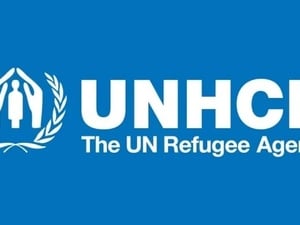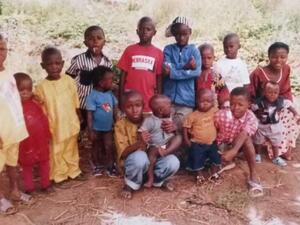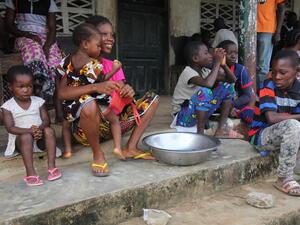Liberia: training workshops for Community Watch Teams
Liberia: training workshops for Community Watch Teams
UNHCR this week launched a series of one-day training workshops for Community Watch Teams (CWT) in eight IDP camps around the Liberian capital, Monrovia. The CWTs are made up of IDP volunteers who carry out regular patrols in the camps during the day and night, and intervene and mediate in case of tensions and conflicts. These teams were already operational before the recent strife in Liberia and were re-established following the conflict. The participants receive training from UNHCR's field safety adviser on how to do community/neighbourhood watch; UNHCR community officers and UNICEF child protection officers on how to deal with children who are ex-combatants; UNMIL (UN Mission in Liberia) and CIVPOL officers on their role in Liberia; and WIPNET (Women in Peace building Network) co-coordinators on negotiation skills and conflict resolution.
A special emphasis is also given to sexual and gender based violence (SGBV) cases in the camps. One of the goals of the training is also to increase the participation of women in the Community Watch Teams to ensure that domestic violence and other abuses against women are not just considered as private matters. The presence of women in the teams is also crucial in preventing and stabilizing a potential violent situation.
The CWTs can report crimes, robberies and other abuses to aid agencies working in the camps or directly to UNMIL.
Meanwhile, in Margibi County, some 35 kilometres from Monrovia, we are again starting to facilitate the movement of IDPs from irregular shelters, mainly school buildings. The operation, which starts today, will be run in conjunction with the government of Liberia and our UN partners. The goal is to transport 2,549 internally displaced persons from three schools and irregular shelters in Harbel Firestone, in Margibi County.
The IDPs will be transferred to the Mt. Barclay, Unification and Ricks IDP centres respectively. These centres are close to counties and districts of origin of the IDPs.
The relocation of IDPs is an interagency initiative which started in early September in Monrovia to relocate a total of some 30,000 displaced people in 56 schools and a clinic, as an effort to decongest the city that was overcrowded due to the June 2003 attack on Monrovia. As a result of this exercise, schools in Monrovia were able to resume classes in November, while thousands of IDPs spontaneously left the irregular shelters for either their homes or established IDP camps.
UNHCR continues to work closely with camp managers and to commit funds and human resources to improve services and ensure that IDPs are received and accommodated in conditions far better than those of irregular shelters. Security at IDP camps is enhanced by the presence of UNMIL. UNHCR has committed 10 trucks to the exercise and assists with the registration, transfer and reception of the IDPs at the camps. UNHCR also carries out distribution of non-food items, follow-ups on protection and other assistance issues in the camps.









